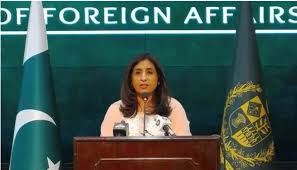Iron Brother China helped Pakistan overcome locust attack, fight Covid-19 and is now supporting agri growth: Pakistani Minister

Federal Minister of National Food Security and Research Syed Fakhar Imam addressed the Twenty Fifth Session of the Near East Forestry and Range Commission (NEFRC) which was virtually hosted by Egypt in Islamabad on 19th October, 2021.
Islamabad: Iron Brother China helped Pakistan overcome the recent locust attack and fight Covid-19 and now Beijing was supporting Pakistan to enhance agriculture production, a senior Pakistani minister said.
Addressing the Twenty Fifth Session of the Near East Forestry and Range Commission (NEFRC) which was virtually hosted by Egypt, Fakhar Imam remarked that Agricultural sector of Pakistan was indispensable to the country’s economic growth, food security, employment generation and poverty alleviation.
“It contributes 192% to the GDP (Gross Domestic Product) and provides employment to around 39% of the labor force. More than 65-70% of the population depends on agriculture for its livelihood. In spite of COVID-19, Locust attack and extreme climatic events the Pakistan agriculture sector’s performance during 2020-21 is encouraging as it grows by 2.77% against the target of 2.8%,” he noted.
China, he said, had always been in picture whenever Pakistan needed its help. “They (China) supported us to defeat the locust and contain Covid-19. Now they (China) are again backing us to enhance the agriculture production (under the second phase of China-Pakistan Economic Corridor),” he mentioned.
The Federal Minister pointed out that agriculture was likely to face severe impacts from climate change, reducing the amount of food that can be grown at a time when more is needed than ever before.
“The planet’s growing population and food consumption will require food production to increase by 70% by 2050. The world population is expected to grow from 7 to 9 billion by 2050. With consumption already at 1.5 times the planet’s replenishing capacity, our current food systems are unsustainable. At the same time, the production, storage, and transport of food causes greenhouse gas emissions which contribute to climate change,” he stated.
He indicated that the food systems were responsible for up to 30% of global greenhouse gas emissions. “The production of rice, which is a staple food for almost half of the world population, is responsible for about 11% of all manmade methane emissions. In addition, cutting down forests for new farmland and unsustainable farming practices are major sources of carbon dioxide (CO2) emissions,” he added.
Fakhar Imam maintained that agricultural sector of Pakistan was indispensable to the country’s economic growth, food security, employment generation and poverty alleviation.
“It contributes 192% to the GDP and provides employment to around 39% of the labor force. More than 65-70% of the population depends on agriculture for its livelihood. The population of the country will be 350 million by 2050 and food requirement will grow immensely,” he contended.
Pakistan, he believed, will be possible if “we wisely use land, water and other available resources.” Furthermore, he observed that to counter such issues, under Prime Minister Imran Khan’s directions Pakistan had already planted billion trees in Khyber Pakhtukhaw while National Scale Ten Billion Afforestation Project is under way.
“These initiatives will increase the forest cover area, desertification control, climate mitigation, biodiversity conservation and ecosystem improvement. The 10 billion afforestation program is further linked to promote Apiculture in the country and production of quality honey with additional plantation of bee supporting flora,” he elaborated.
The Federal Minister emphasized that healthy forest ecosystems were essential for sustainable agriculture production.





